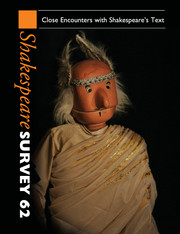Book contents
- Frontmatter
- Shakespeare, text and paratext
- The popularity of Shakespeare in print
- The continuing importance of new Bibliographical method
- ‘Honour the real thing’: Shakespeare, Trauma and Titus Andronicus in South Africa
- ‘O, these encounterers’: on Shakespeare’s meetings and partings
- A play of modals: Grammar and potential action in early Shakespeare
- Merry, marry, Mary: Shakespearian wordplay and Twelfth Night
- A subtle point: Sleeves, tents and ‘Ariachne’s broken woof’ (again)
- The look of Othello
- Red button Shakespeare
- ‘Mark you / his absolute shall?’: Multitudinous tongues and contested words in Coriolanus
- Chagall’s Tempest: An autobiographical reading
- Reading illustrated editions: Methodology and the limits of interpretation
- Close encounters with Anne Brontë's Shakespeare
- Shakespeare and the magic lantern
- Shakespeare and the coconuts: close encounters in post-apartheid South Africa
- The Schrödinger effect: Reading and misreading performance
- Behind the scenes
- Inner monologues: Realist acting and/as Shakespearian performance text
- More japanized, casual and transgender shakespeares
- Translation futures: Shakespearians and the foreign text
- After translation
- ‘The single and peculiar life’: Hamlet’s heart and the early modern subject
- Mapping King Lear
- ‘Last on the stage’: The place of Shakespeare in Charles Darwin’s ethology
- Sense/memory/sense-memory: Reading narratives of Shakespearian rehearsals
- Shakespeare performances in England (and Wales), 2008
- Professional Shakespeare productions in the British Isles, January–December 2007
- The Year's Contributions to Shakespearian Study 1 Critical Studies
- 2 Shakespeare in performance
- 3a Editions and textual studies
- 3b Editions and textual studies
- Index to Volume 62
A play of modals: Grammar and potential action in early Shakespeare
Published online by Cambridge University Press: 28 November 2009
- Frontmatter
- Shakespeare, text and paratext
- The popularity of Shakespeare in print
- The continuing importance of new Bibliographical method
- ‘Honour the real thing’: Shakespeare, Trauma and Titus Andronicus in South Africa
- ‘O, these encounterers’: on Shakespeare’s meetings and partings
- A play of modals: Grammar and potential action in early Shakespeare
- Merry, marry, Mary: Shakespearian wordplay and Twelfth Night
- A subtle point: Sleeves, tents and ‘Ariachne’s broken woof’ (again)
- The look of Othello
- Red button Shakespeare
- ‘Mark you / his absolute shall?’: Multitudinous tongues and contested words in Coriolanus
- Chagall’s Tempest: An autobiographical reading
- Reading illustrated editions: Methodology and the limits of interpretation
- Close encounters with Anne Brontë's Shakespeare
- Shakespeare and the magic lantern
- Shakespeare and the coconuts: close encounters in post-apartheid South Africa
- The Schrödinger effect: Reading and misreading performance
- Behind the scenes
- Inner monologues: Realist acting and/as Shakespearian performance text
- More japanized, casual and transgender shakespeares
- Translation futures: Shakespearians and the foreign text
- After translation
- ‘The single and peculiar life’: Hamlet’s heart and the early modern subject
- Mapping King Lear
- ‘Last on the stage’: The place of Shakespeare in Charles Darwin’s ethology
- Sense/memory/sense-memory: Reading narratives of Shakespearian rehearsals
- Shakespeare performances in England (and Wales), 2008
- Professional Shakespeare productions in the British Isles, January–December 2007
- The Year's Contributions to Shakespearian Study 1 Critical Studies
- 2 Shakespeare in performance
- 3a Editions and textual studies
- 3b Editions and textual studies
- Index to Volume 62
Summary
'what men may do'
(William Shakespeare)'Yes, we can.'
(Barack Obama)GRAMMAR, HISTORY AND METHOD
The relation between grammar and early modern drama is overdue for renewed analysis. To illustrate my point, the particular grammatical form I wish to focus on in this article is the Early Modern English modal auxiliary verb and the extraordinary work it does in articulating potential action in the new drama of the late sixteenth century, especially as that work is evidenced in such early Shakespeare plays as Titus Andronicus and Richard III. The 'close encounters' will be with dramatic exchanges taking shape around 'a play of modals', dialogic interactions highlighting and making theatrical meaning out of what might seem inconsequential linguistic detail - modality and its expression in modal auxiliary verbs. A long-standing semantic category for what becomes grammaticalized in languages in various ways, definition of modality is vexed and contested: I understand it here as concerned with the speaker's assessment of, or an agent's orientation to, the possible truth of a proposition or the potentiality of a state of affairs. By the 1590s, during a period of particularly rapid linguistic change in Early Modern English, a group of modal verbs including 'may', 'must', 'can', 'will', and 'shall' had become differentiated in syntactic form from the full lexical verbs they derived from in Old English, losing their non-finite forms, no longer taking non-verbal objects, and generally followed by infinitives without a to-link. They were also undergoing semantic and pragmatic changes that resulted, as we shall see, in a system with a curiously double register of meanings for auxiliary verbs like 'must' and 'may'. Modern-day linguists brought this double register into focus when they distinguished between epistemic modality, concerned with gradations of knowledge or belief about the truth of propositions, and deontic modality, concerned with duty, obligation and permission.
- Type
- Chapter
- Information
- Shakespeare Survey , pp. 69 - 80Publisher: Cambridge University PressPrint publication year: 2009
- 3
- Cited by

